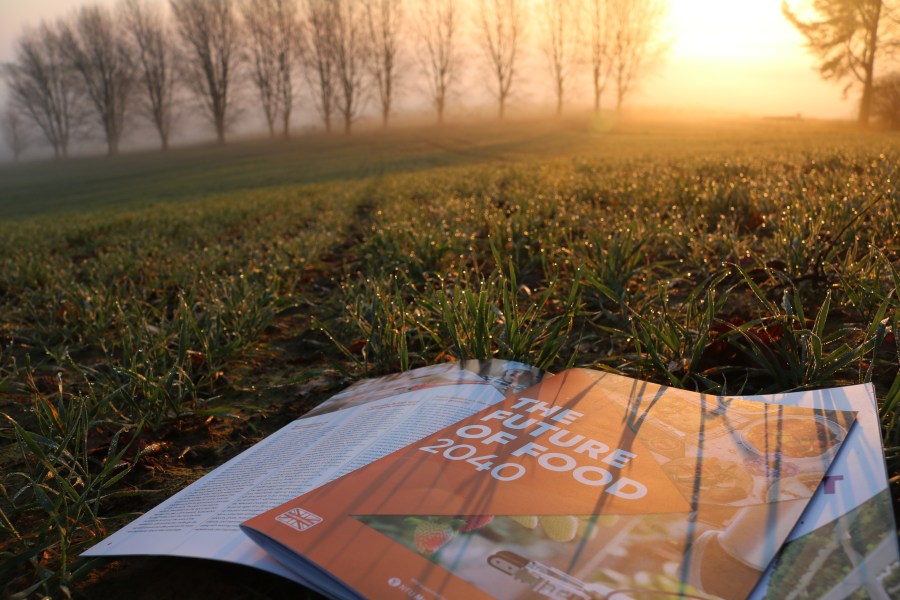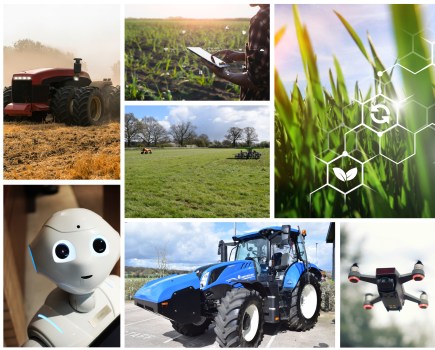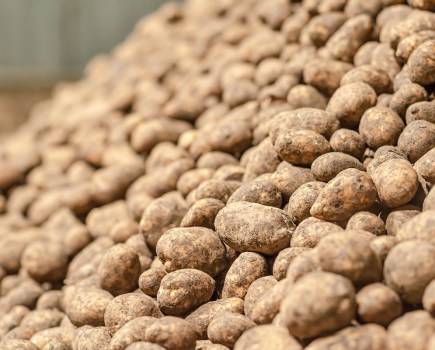The NFU launched at its conference Future of Food 2040 – a vision for how UK farmers will supply the supermarket shelves in 20 years’ time and how farm businesses will adapt to the challenge. CPM reports.
Farmers are on the front line of this revolution in how the nation’s food is produced.
By Tom Allen-Stevens
A flexitarian consumer, increasingly concerned about dietary health and demanding to know more about where their food comes from; food produced by autonomous robots, responding to signals from a plethora of nanosensors in the field that direct inputs precisely to where they’re required; a farmer who’s harnessed the use of big data in managing risk and knows exactly when, where and how to intervene; a farm on which mitigation of climate change commands a currency and conservation is managed as a profitable crop.
This is the Future of Food in 2040, according to the NFU, launched at its conference last month. “Farmers are on the front line of this revolution in how the nation’s food is produced,” says NFU head of policy services Dr Andrea Graham. “We have time to adapt to avoid some of the trip hazards.”

With 41% of meat-eaters now classed as flexitarian, the trend away from traditional meat may continue. Photo: Shutterstock nd3000
She interviewed more than 50 industry leaders and commentators, farmers, scientists, environmental groups, government representatives, retailers and economists to draw together a vision of the future. The report, based on over 100 hours’ worth of these conversations, covers four main areas:
- What we’ll be eating
- How we’ll be producing it
- How this will impact on British food and farming
- Opportunities for new markets
Diets will evolve, and while fads will come and go, there is a trend towards dish-based meals and away from those where a primary protein is the focal point, as the population ages and becomes more urban. Dietary health is set to become more important, but harder to define is how the rise in food-to-go will square with the renaissance in cooking from scratch.
With 41% of meat-eaters now classed as flexitarian, consuming it only occasionally, the trend away from traditional meat may continue. But it could be replaced with in-vitro meat and insect protein, rather than an increase in plant-based food.
“One of the key things to take from this report is the drive there’ll be towards greater transparency,” notes Andrea. “We’ll see ever-greater scrutiny of our production and processing systems, driven by consumers and provided through new technologies such as blockchain.” High standards on environment, safety and welfare will become the expected norm.
New breeding technologies (NBTs) will be ubiquitous in 20 years, with CRISPR one of the methods of gene-editing that will bring crops with enhanced disease resistance and stress tolerance, provided consumer acceptance is handled correctly. Vertical farming will see huge growth to become a multi-billion pound industry putting leafy salads and certain vegetables on the market.
In the field, the reliance on chemistry to provide solutions will continue to drop away, and an even more integrated approach will see a greater use of biostimulants and biological agents to develop a crop’s own defence mechanisms. There may be entirely new “game-changing” technologies to manage major challenges, such as resistant blackgrass.
Nanosensors will join an increasing array of weather stations and soil probes, linking seamlessly to smart applications to build agriculture’s ‘internet of things’, predicts the report. Tractors will get smaller and lighter and become driverless – The Small Robot Company is profiled as an example of how autonomous crop care will be carried out on a plant-by-plant basis.
“All of these technologies we talk about, or they’re in prototype,” Andrea points out. “The real challenge that we absolutely need to see is for all of them to scale up so that farm businesses can benefit from the advantages they have the potential to bring over the next few years.”
Andrea notes that perhaps one of the biggest changes farmers will face will be the transformative role of data. She calls it “big data meets big biology”, and the success of the future farm will be in how farmers capture the colossal increase in available data and use it to inform everyday decisions.
“We could get to a point where a smart device feeds you real-time information on exactly what an intervention will do for your productivity, resource efficiency and profitability a certain number of days, months or even years down the line. That has the potential to be a real game-changer.”
Farms won’t look any different, but they will be under the surface, with a much greater level of collaboration and information sharing. “Business success will be defined by a farmer’s ability to manage risk – how data is used, how the business restructures and the farm diversifies,” she reasons.
The report’s approach to exploring new market opportunities moves away from food and focuses on the fact the agricultural sector manages 71% of land in England. It recognises that Government funding will be directed towards the delivery of public goods, and for some farmers conservation will become a “crop”, as environment services become more freely traded.
An example could be in soil management, where positive practices could develop, not only to benefit the long-term sustainability of the farming business, but to deliver a form of carbon storage, returning a credit to farmers. It ties in neatly with the NFU’s target of ensuring British Farming is making a ‘net zero’ contribution to climate change. This will be delivered and incentivised, not just through increases in productive efficiency, but through targeted measures of carbon capture and storage, and renewable energy generation.
Conservation of iconic and marginal landscapes will be carried out on a contractual basis, with farmers paid for the delivery of specific outcomes, such as tree planting to address flooding. Key to this is the industry taking ownership of the environment and being seen as the solution, rather than the problem, says the report. There’s a call for a more united voice to tell farming’s positive story, working hand-in-hand with scientists and innovators.
So what are the three things that stand out from the report? “The risk management and that drive and desire for transparency in the food system. But also business focus – using that innovation, our skills and knowing our end market,” summarises Andrea.
“The cornerstones we have been developing at the NFU around productivity, the environment and volatility do map really well onto the key themes in the report. It’s absolutely critical these building blocks are embedded in the Agriculture Bill that’s going through Parliament, if we’re to have that bright future.”
Farmers get funding for on-farm trials
Rothamsted Research is launching a new fund to support innovative on-farm research, with all projects to be thought up, co-designed, and run by farmers. Each farmer involved will receive up to £3000 to cover the eligible costs of running their trial.
Part funded by AHDB, the aim of FarmInn is to provide real world, scientifically robust solutions to the challenges currently faced by UK agriculture. “We all know what these are, but no one is more acutely aware than farmers themselves,” says project leader Dr Ian Shield.
The plan is to support about seven projects in the first instance, with farmers paired with an expert in the field, to address the challenges and explore issues together. The FarmInn scheme is unique in that it will also provide free access to Rothamsted’s researchers and facilities. “FarmInn gives farmers a chance to find solutions to the things that matter most to the agricultural community,” continues David.
“Any proposal that addresses the efficiency, productivity and sustainability of farm businesses will be considered. We want to hear from the farmers themselves.”
Farmers are being asked to submit their idea via a short, simple application form and projects will be chosen by a panel of Rothamsted staff, who’ll then assign a suitable scientist to work with the applicant to produce a project plan.
The initiative will work closely with the Innovative Farmers scheme which already has an established network of farmers and growers running on-farm trials. “The two will complement each other greatly,” notes Dr Kate Pressland, programme manager of Innovative Farmers.
“We anticipate some of our Field Labs graduating to FarmInn to give them the potential to be scaled up and more rigorously tested. Likewise, some FarmInn applications may be referred to our scheme for proof of concept testing or as a pilot to more detailed research.”
Innovative Farmers will have representation on the FarmInn Steering Group along with AHDB, Agri-Tech East, LEAF, and the NFU. The FarmInn Steering Group will allocate appropriate resources once the project plan has been completed.
Head of arable knowledge exchange at AHDB Tim Isaac believes it fits in well with their involvement with Innovative Farmers and AHDB’s own network of Strategic and Monitor farms. “FarmInn champions our preferred farmer-led approach while focusing on farm-based trials as the key to unlocking improvements in productivity,” he says.
“This initiative will help in the faster dissemination of learning that the industry rightly demands. Furthermore, by combining science with practice it should also help to identify new approaches that are both robust and relevant.”
Rothamsted will be working with AHDB to make sure the findings from the initiative are shared as widely as possible, says David. “Linking Rothamsted Research scientists with farmers who are pro-active and innovative will build better relationships and create a dialogue to influence future research projects,” he adds.
“Farmers are by nature great innovators, continually striving for new and better ways of doing things. They also possess a huge wealth of expertise, and when it comes to their own land, an unrivalled level of knowledge.
“We aim to support that spirit of discovery by taking away some of the financial risks of trying something new, and by providing them with specialist support in terms of designing experiments, collecting data and analysing results.”
More information on the FarmInn scheme, including how to apply, can be found at: https://www.rothamsted.ac.uk/farminn




